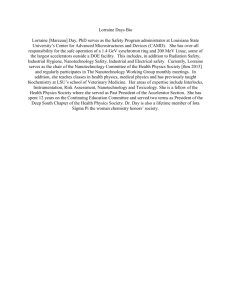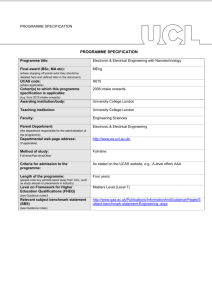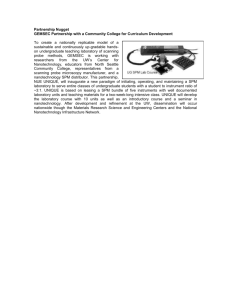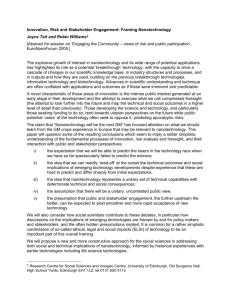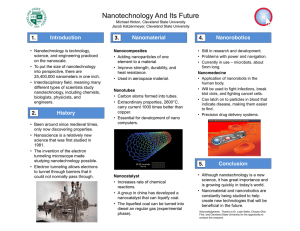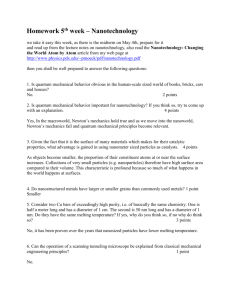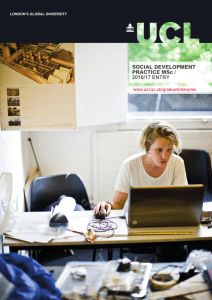NANOTECHNOLOGY MSc / 2016/17 ENTRY www.ucl.ac.uk/graduate/eleceng
advertisement
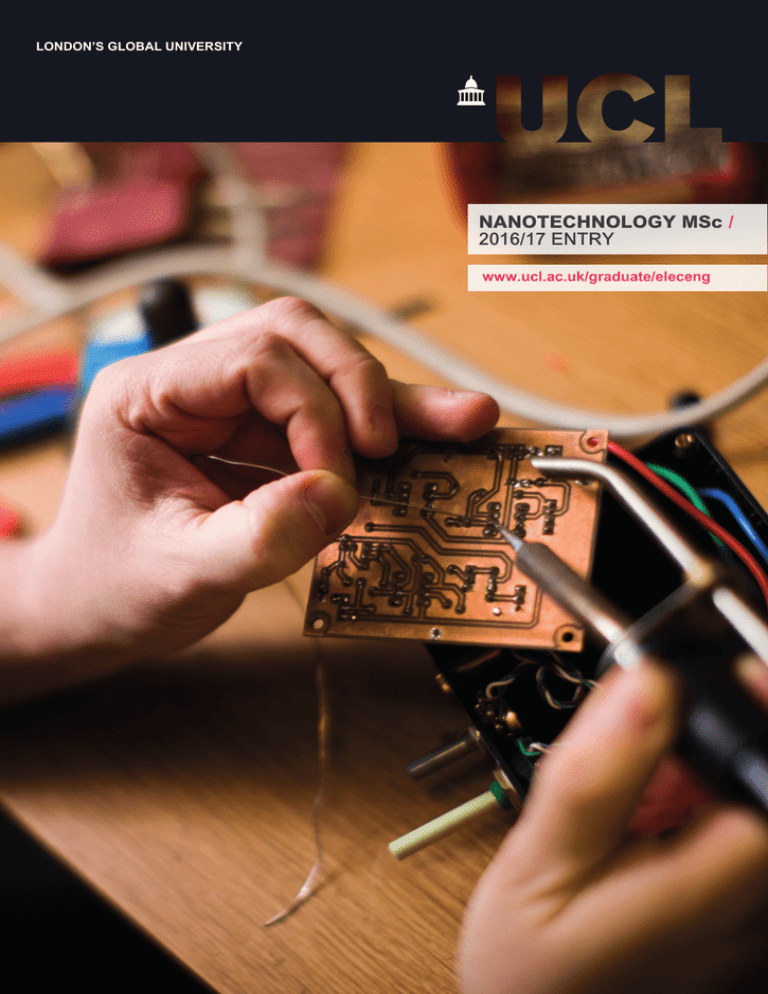
LONDON’S GLOBAL UNIVERSITY NANOTECHNOLOGY MSc / 2016/17 ENTRY www.ucl.ac.uk/graduate/eleceng Nanotechnology MSc / This MSc is designed for graduates from the physical sciences and relevant engineering disciplines who wish to develop skills in this new and exciting area. Nanotechnology is rapidly establishing itself as a key technology, in industries ranging from microelectronics to healthcare, with a consequent demand for appropriately trained graduates. Degree summary The programme introduces students to and provides training in the skills essential for almost all fields of nanotechnology research, including key laboratory skills and techniques in planning, building devices, analysis, and results comparison. The core lecture programme covers essential topics in physics, electrical and electronic engineering, and biology. // // // The London Centre for Nanotechnology (LCN) is a new UK based multidisciplinary enterprise operating at the forefront of science and technology. Forming a bridge between the physical and biomedical sciences, it brings together two of the world's leading institutions in nanotechnology, UCL (University College London) and Imperial College London. The centre aims to provide leading-edge training in nanotechnology and students on this programme benefit from excellent new facilities, including a £14 million research building furnished with state-of-the art equipment, and a £1million teaching facility in UCL Electronic and Electrical Engineering. The programme is delivered through a combination of lectures, laboratory classes, tutorials and seminars. Student performance is assessed through coursework, laboratory notebooks, case studies, written examination, a dissertation, and written and oral presentations. Degree structure Mode: Full-time: 1 year; Part-time: 2 years Students undertake modules to the value of 180 credits. The programme consists of six core modules (75 credits), three optional modules (45 credits) and a research project (60 credits). A Postgraduate Diploma (120 credits) is offered. The diploma consists of six core modules (75 credits) and three optional modules (45 credits). CORE MODULES // Physical Science for Nanotechnology // Nanoscale Processing and Characterisation for Advanced Devices // Instrumentation and Physical Techniques in the Life Sciences // Experimental Techniques for Nanotechnology // Nanotechnology and Society // Nanoelectronic Devices OPTIONS // Quantum Computation and Communication // Order and Excitations in Condensed Matter // Molecular Biophysics // Molecular Physics // Entrepreneurship: Theory and Practise // Plastic and Molecular Electronics // Physics and Optics of Nano-Structures // Nanotechnology in Healthcare // Innovation Practices DISSERTATION/REPORT // All students undertake an extensive research project on an experimental or theoretical topic which is assessed through two interim reports, dissertation and oral examination. Your career Recent graduates have gone on to work as engineers for companies including EDF Energy and Intel, as analysts and consultants for firms including Standard Bank PLC and DN Capital, or to undertake PhD study at the Universities of Oxford, Bath and Glasgow. Employability This MSc programme provides a broad and comprehensive coverage of the technological and scientific foundations of nanotechnology, from the basis of the fabrication of nanostructures for advanced device applications, to fundamental quantum information and molecular biophysics, from nanotechnology in life science to nanotechnology in healthcare, and from experimental technology to theoretical modelling. Nanotechnology MSc graduates are expertly equipped either to pursue PhD study or become consultants or engineers in a wide range of nanotechnology fields. Entry requirements Normally a minimum of an upper second-class Bachelor's degree in a relevant discipline from a UK university or an overseas qualification of an equivalent standard. English language proficiency level If your education has not been conducted in the English language, you will be expected to demonstrate evidence of an adequate level of English proficiency. The level of English language proficiency for this programme is: Standard. Information about the evidence required, acceptable qualifications and test providers is provided at: www.ucl.ac.uk/graduate/english-requirements Your application The deadline for all applicants is 29 July 2016. Students are advised to apply as early as possible due to competition for places. Those applying for scholarship funding (particularly overseas applicants) should take note of application deadlines. When we assess your application we would like to learn: // // // // why you want to study Nanotechnology at graduate level // how you envisage your career path after the MSc why you want to study Nanotechnology at UCL what particularly attracts you to this programme how your academic and professional background meets the demands of this programme Together with essential academic requirements, the personal statement is your opportunity to illustrate whether your reasons for applying to this programme match what the programme will deliver. Details on how to apply are available on the website at: www.ucl.ac.uk/graduate/apply PDF Updated: May 25, 2016 Information correct at time of going to press. See website (www.ee.ucl.ac.uk/) for latest information FEES AND FUNDING // UK & EU (2016/17) entry: £11,090 (FT) // Overseas (2016/17) entry: £23,440 (FT) // UK & EU (2016/17) entry: £5,725 (PT) // Overseas (2016/17) entry: £11,670 (PT) The Institution of Engineering and Technology (IET) also awards competitive scholarships for postgraduate study, for details visit www.theiet.org Please visit the UCL Electronic and Electrical Engineering Scholarships website for more information on funding. Full details of funding opportunities can be found on the UCL Scholarships website: www.ucl.ac.uk/scholarships APPLICATION DATE All applicants: 29 July 2016 CONTACT Electronic Engineering Email: mscenquiries@ee.ucl.ac.uk Telephone: +44 (0)20 7679 7300
